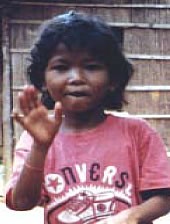Orang Seletar in Malaysia

Photo Source:
Copyrighted © 2026
Southeast Asia Link - SEALINK All rights reserved. Used with permission |
Send Joshua Project a map of this people group.
|
| People Name: | Orang Seletar |
| Country: | Malaysia |
| 10/40 Window: | Yes |
| Population: | 2,100 |
| World Population: | 3,300 |
| Primary Language: | Orang Seletar |
| Primary Religion: | Ethnic Religions |
| Christian Adherents: | 5.00 % |
| Evangelicals: | 3.00 % |
| Scripture: | Portions |
| Ministry Resources: | No |
| Jesus Film: | Yes |
| Audio Recordings: | Yes |
| People Cluster: | West Malaysia Indigenous |
| Affinity Bloc: | Malay Peoples |
| Progress Level: |
|
Introduction / History
The Orang Seletar are one of the nineteen Orang Asli people groups living in Peninsular Malaysia. The Malaysian government classifies them under the Aboriginal Malay (officially called Proto-Malay) subgroup. Nearly half of the Orang Seletar ethnic group also live in northern Singapore.
They are a maritime people, the descendants of the Orang Laut or sea people who constituted the original navy of the Malaccan Sultanate and played a pivotal role in the region's history. Originally from the Spice Islands in Indonesia, five hundred years ago they roamed the Straits of Malacca in bands, raiding, burning, and pillaging. They were the pirates of South East Asia. The Orang Seletar have settled down in the states of Johor and Selangor. They no longer live in boats but in huts built on water. In some places, they live in houses built on land.
What Are Their Lives Like?
The Orang Seletar have been generally integrated into the Malay community to the extent that they are in danger of forgetting the central role they played in early Malaysian history. In fact, some royal families in Malaysia have Orang Seletar ancestors! Those who have retained their old nomadic lifestyle prefer to live by the sea and remain one of the poorest minority groups of Asia. They are specialists in harvesting the produce of the sea, shore, and mangroves for their own consumption and for trade.
Presently, they strive to survive through harvesting fish, rearing mussels, and catching prawns and crabs in the waters along the Tebrau Straits. The sea, however, has become polluted and their food sources are deteriorating. A few have found jobs at nearby restaurants and factories.
The Orang Seletar are still nomads, but for a different reason - they are forced to move from where they are living whenever there is government acquisition of land. In some areas, development activities have caused much anxiety and frustration among the affected villagers while they hope to get fair and adequate compensation to build their new communities.
What Are Their Beliefs?
Many Orang Seletar worship spiritual beings believed to dwell in the coastal areas and in the depths of the sea. In contrast, death and illness are bound to the land. They go ashore to heal the sick or to bury their dead.
While spirits (hantu) roam everywhere - on trees, under water and rocks, in caves, and even in the air - the sole condition of this sea-people is respect. They believe that failure to respect the environment - the abode of the spirits - results in illness, conflict, and death. The only cure lies in exorcism and appeasement of the spirits.
What Are Their Needs?
The Orang Seletar are one of the poorest of the poor in Malaysia. Formal education and vocational training would be helpful to the Orang Seletar. There are ongoing needs, such as the setting up of infrastructure in their region, which remain unaddressed.
Prayer Points
Pray for believers who can assist in these needs of the Orang Seletar.
Pray for God to bless them materially and spiritually.
Pray that Orang Seletar will have a zeal for Christ that will lead them to spread Christ's fame throughout Malaysia.